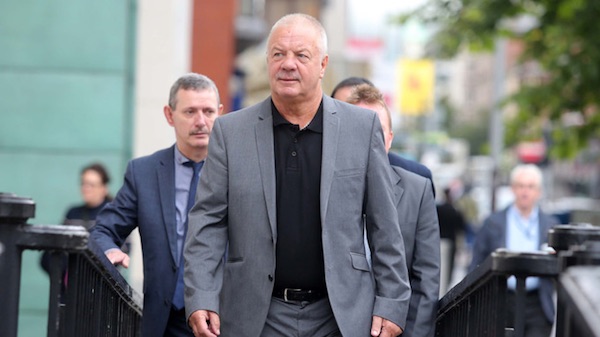
The peace process is based upon membership of the European Union, the High Court in Belfast has heard, in one of two legal challenges to be taken against the British decision to withdraw from the EU.
Victims campaigner Raymond McCord (pictured) and a group of politicians are seeking to judicially review the British government’s move towards leaving the EU. Both cases centre on London’s response to the June 23 referendum result. Even though the ‘United Kingdom’ overall voted narrowly to leave, a clear majority in the Six Counties of Ireland under British rule voted to remain.
A judge in Belfast was told on Monday that there are issues and implications specific to the north of Ireland.
Ronan Lavery QC, representing Raymond McCord, said: “The very basis of the peace process and the Good Friday Agreement, we say, is based upon the membership of both states to the European Union.”
Mr McCord’s legal team contend Brexit will undermine the domestic and international treaty obligations Britain entered into under the 1998 Good Friday peace Agreement.
The campaigner, whose son Raymond McCord Jr was murdered by the UVF in north Belfast in 1997, is taking the case amid concerns that European peace money which goes towards victims of the conflict may be discontinued.
Mr McCord expressed fears for the potential impact on the peace deal. He added: “There’s no way that victims are going to trust the British government that funding will remain in place.”
He has been supported by former 26 County government minister Dermot Ahern. Mr Ahern wrote: “I am aghast at the potential negative fallout for this island as a result of the vote, not least the implications for the Good Friday agreement architecture.”
The politicians, which include Sinn Fein’s John O’Dowd, claim it would be unlawful to trigger Article 50 of the Lisbon Treaty - the formal process for confirming ‘Brexit’ - without first securing parliamentary authorisation. Similar legal challenges are already underway in London.
Outside court Mr O’Dowd said the legal challenge was being taken in Belfast to protect the rights of the 56% in the north of Ireland who voted to remain. He said: “This is probably one of the most important constitutional cases that has been heard here for decades.”
Meanwhile, the 26 County Taoiseach Enda Kenny has delivered another speech to outline his government’s response to Brexit. He told the annual meeting of the British-Irish Association in Oxford on Friday that the possibility of Irish unity must be considered in Britain’s negotiations to leave the EU, so that both parts of a unified Ireland could be part of the EU.
He said that achieving Irish unity, by purely peaceful means and by consent, is a “lynchpin” of the Good Friday Agreement and of the peace process.
“The possibility of unity by consent must be maintained as a valid democratic option into the future,” he said. “That means that, if there were democratic consent to Irish unity at some time in the future, there must be a mechanism to ensure that democratic decision can be implemented within the European Union, as was the case in Germany.”
The Taoiseach, who raised the prospect of a border poll shortly after the Brexit vote, said he did not believe there should be a border poll now.
“There is no convincing evidence to suggest that a majority of the people of Northern Ireland would opt for a change in its constitutional status. There are more urgent issues facing our island than a border poll,” he said.
Mr Kenny said that the impact of Brexit on the island of Ireland was an all-island issue and that his government will soon propose a mechanism to facilitate a “conversation” involving groups and individuals from North and South.
Sinn Fein National Chairperson Declan Kearney Assembly has said a wide-ranging debate on what a united Ireland would look like is required.
He described the publication of an opinion poll, which shows an increase in the support for unity in the Six Counties, is significant.
“The parties in the south in favour of unity should join the debate on the shape of a new Ireland and how we bring it about,” he said. “The Brexit decision is a watershed for the entire island; all the old certainties have been swept away. Let’s begin the debate about the future.”
![[Irish Republican News]](https://republican-news.org/graphics/title_gifs/rn.gif)
![[Irish Republican News]](https://republican-news.org/graphics/title_gifs/harp.gif)

